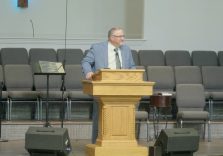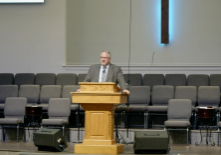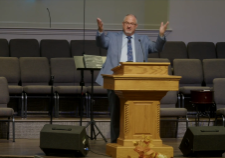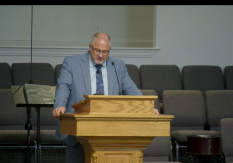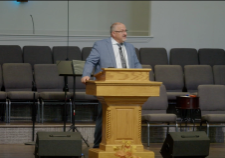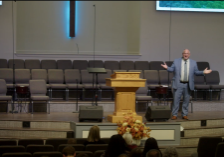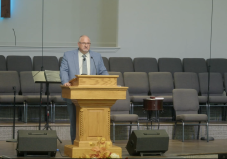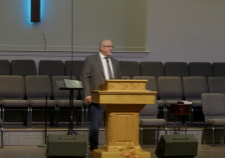The discussion centers on the prophetic significance of Daniel’s 70 weeks, emphasizing that these weeks symbolize a divinely designated timeline for Israel. The speaker elucidates how this prophecy outlines the historical and future events that will unfold, particularly the coming of the Messiah and the eventual acceptance of Jesus by the Jewish nation. He highlights that while the first 69 weeks have been fulfilled, the final week remains, which is marked by significant turmoil and the actions of the Antichrist. The speaker further reflects on the importance of prayer, illustrating Daniel’s model of prayer that includes praise, repentance, and supplication. Ultimately, the episode serves to reassure listeners of God’s sovereignty over human affairs and the unfolding of His prophetic calendar, encouraging them to remain vigilant and hopeful for the future.
A profound exploration of Daniel’s prophetic insights unfolds as Speaker A delves into Chapter 9, emphasizing the significance of God’s sovereignty in human history. He articulates the narrative of Daniel’s prayer, during which he earnestly seeks forgiveness for his sins and the transgressions of his people. The speaker presents a detailed examination of the 70 weeks prophecy, a pivotal element in biblical eschatology that outlines the timeline for the Jewish people and the coming of the Messiah. The speaker asserts that this prophecy is crucial for understanding God’s plan for Israel, framing it within the historical context of the Medo-Persian Empire’s rise and the subsequent significance of Jerusalem’s restoration. He articulates the theological implications of Israel’s eventual acceptance of Jesus as the Messiah, highlighting the paradox of their initial rejection and anticipated future acceptance. This exploration not only underscores the intricate relationship between prayer and divine revelation but also emphasizes the overarching theme of God’s control over earthly affairs, inviting listeners to reflect on the profound mysteries of faith and prophecy.
Transcript
Chapter 9, verse 20.
Speaker A:And while I was speaking and praying, and confessing my sin and the sin of my people Israel, and presenting my supplication before the Lord my God, for the holy mountain of my God, yea, whilst I was speaking in prayer, even the man Gabriel, whom I had seen in the vision at the beginning, being caused to fly, swiftly touched me about the time of the evening oblation, the evening sacrifice.
Speaker A:And he informed me and talked with me, and said, O Daniel, I am now come forth to give thee skill and understanding.
Speaker A:At the beginning of thy supplications the commandment came forth, and I am come to shew thee, for thou art greatly beloved.
Speaker A:Therefore understand the matter and consider the vision.
Speaker A:70 weeks are determined upon thy people and upon the holy city to finish the transgression and to make an end of sins, and to make reconciliation for iniquity, and to bring in an everlasting righteousness, and to seal up the vision and prophesy, and to anoint the Most High, the Most Holy.
Speaker A:Verse 25.
Speaker A:Know therefore and understand that from the going forth of the commandment to restore and to build Jerusalem unto the Messiah, the prince shall be seven weeks and threescore and two weeks the street shall be built again, and the wall, talking about the wall of Jerusalem, even in troublous times.
Speaker A:And after threescore and two weeks shall Messiah be cut off, but not for himself.
Speaker A:And the people of the prince that shall come shall destroy the city, and the sanctuary, and the end thereof shall be with a flood, and unto the end of the war desolations are determined.
Speaker A:Verse 27.
Speaker A:And he shall confirm the covenant with many for one week.
Speaker A:Speaking of the Antichrist here in the midst of the week, he shall cause the sacrifice and the oblation to cease.
Speaker A:And for the overspreading of the abominations he shall make it desolate even until the consummation.
Speaker A:And that determined shall be poured upon the desolate.
Speaker A:Let's pray.
Speaker A:Heavenly Father again bless the reading of your word.
Speaker A:We do pray tonight that you would make this very clear.
Speaker A:And Lord, again I can teach, but your Holy Spirit gives understanding.
Speaker A:And I pray God that you'd open our eyes, help us to understand marvelous things out of thy words.
Speaker A:In Jesus name.
Speaker A:Amen.
Speaker A:The theme of Daniel is God rules in the affairs of man.
Speaker A:And it's so appropriate right now to be reminded over and over and over again that.
Speaker A:That it's God who puts kings in place, it's God who takes kings down, it's God who puts presidents in place, It's God who puts them down.
Speaker A:God's in control.
Speaker A:He rules in the affairs of men.
Speaker A:In chapter nine, the timeframe is one year into the rule of the Medo Persian empire.
Speaker A:So now the Babylonian empire has passed Belshazzar, you know, the Medo Persian empire enter Babylon, the city of Babylon under the wall.
Speaker A:They diverted the Euphrates river, went under the wall and defeated Babylon.
Speaker A:So now the Medo Persian empire is now is ruling.
Speaker A:This chapter nine is a key chapter to understanding the big picture of God's prophetic calendar.
Speaker A:Again, it gives you the overview of God's prophetic calendar.
Speaker A:It gives us a time frame in which the Lord is going to prepare Israel as a nation to finally accept Jesus as the Messiah.
Speaker A:Again.
Speaker A:The first time Christ came and was born and lived and died, the Jews rejected as a nation, rejected Jesus as their Messiah.
Speaker A:I was reminded this afternoon too.
Speaker A:Remember the names now.
Speaker A:Jesus means Savior, Lord means boss, Christ means Messiah.
Speaker A:So when we say Jesus Christ, Jesus Savior, Christ, the Messiah.
Speaker A:So one day they rejected him the first time the Jews did as a nation.
Speaker A:But one day they will accept him as the Messiah.
Speaker A:One day they will accept him as the Christ, the long awaited one, the one, the Messiah.
Speaker A:And so that's what we see in this chapter, this time frame which will transpire.
Speaker A:We preached last Sunday night about the first 19 verses and again the first two verses.
Speaker A:Daniel is studying and he is pondering.
Speaker A:He's reading the book of Jeremiah.
Speaker A:He's reading Jeremiah's prophecies concerning the seventy years of captivity.
Speaker A:We find that in Jeremiah chapter 29:4 through 10, where Jeremiah prophesies concerning the seventy years that the Jews would go into captivity.
Speaker A:Remember the prophets in Jerusalem were saying and in Babylon were saying, oh no, the captivity is going to be for a short time.
Speaker A:But they were false prophets.
Speaker A:And Jeremiah comes along and says, no, you might as well go ahead and build houses, might as well go ahead and plant your vineyards and plant your crops because you're going to be there a while.
Speaker A:You're going to be there 70 years.
Speaker A:They didn't like Jeremiah for that.
Speaker A:They persecuted him, threw him in a hole and so many other things they did to Jeremiah.
Speaker A:But Daniel was reading that and he could see and because of his understanding as he was studying this particular prophecy, that that time was either it was either up here in our chapter or it was about to end.
Speaker A:So that 70 years was about to end, or maybe it had already ended.
Speaker A:He's also pondering.
Speaker A:The Bible says other books.
Speaker A:No doubt he would been pondering and studying Isaiah and over 100 years before the captivity, over 100 years before the.
Speaker A:I'm sorry, before the return of the remnant back to Jerusalem, Isaiah prophesied concerning the Medo Persian empire that Cyrus would be the one who would allow the children of Israel to return and rebuild Jerusalem.
Speaker A:Cyrus gave his name over 100 years before he would make that proclamation.
Speaker A:It's amazing.
Speaker A:I have, in my opinion, and I'm, you know, hardly ever right, but now in this instance, I think Daniel went into Cyrus and said, hey, Daniel would have been in his 80s, went into Cyrus, said, hey, you're in our book.
Speaker A:It's amazing.
Speaker A:And then chapter three through 19, or chapter verses three through 19, we see Daniel's model prayer as he prays for Israel, as he prays for his country, as he prays for his nation, as he prays for God's people, as he asks.
Speaker A:Again, we see in this model prayer that he speaks about the attributes of God and how great and powerful God is, all knowing.
Speaker A:And he mentions many things.
Speaker A:He praises God for who he is.
Speaker A:And I encourage you when you are praying that you start your prayer by thanking and praising the Lord.
Speaker A:Take a little time to praise him and thank him for what he's done.
Speaker A:The model prayer again of Daniel and then repent.
Speaker A:He prayed for and repented of his sins.
Speaker A:He included himself in there.
Speaker A:And for the sins of the nation.
Speaker A:And again, as we pray, we ought to repent of our sins.
Speaker A:Notice sins, plural.
Speaker A:So, yes, you know, you could pray that, lord, forgive me for my sin.
Speaker A:But the Bible, the model is that you should pray for your sins and repent of your sins individually.
Speaker A:And you say, I can't remember all those.
Speaker A:Well, ask the Holy Spirit to help you.
Speaker A:When Daniel said, lord, you know, search me, try me, know my heart and ask for his help in remembering those things in which you have done.
Speaker A:And he prayed for himself.
Speaker A:He prayed for his nation.
Speaker A:Boy, we need to pray for our nation, don't we?
Speaker A:What a mess.
Speaker A:Again, as we say, what a mess.
Speaker A:But we also say, still the greatest nation on the face of the planet, still the greatest nation in the world.
Speaker A:But pray for our nation, pray for our leaders, but repentant, and then ask again.
Speaker A:When you are praying, pray means to ask.
Speaker A:So prayer should involve some asking.
Speaker A:So pray for others, ask for others, and then pray for yourself.
Speaker A:It's not wrong to ask for yourself as well and certainly encourage you to pray for others first.
Speaker A:It'd kind of be kind of weird, you know, don't.
Speaker A:Yeah, do it the other way and then yield Yield to the will of God.
Speaker A:God, whatever you, this is in your hands.
Speaker A:And yield.
Speaker A:So that's the acrostic.
Speaker A:Pray P R A Y.
Speaker A:Praise, repent, ask and yield.
Speaker A:Maybe you learned it as acts.
Speaker A:So the acrostic acts, acknowledgement of Christ and his God and his attributes.
Speaker A:Confess your sins and supplication.
Speaker A:Supplication means to beseech or beg and then thanksgiving.
Speaker A:So there's your model prayer.
Speaker A:Encourage you.
Speaker A:We ought to be people of prayer.
Speaker A:And then tonight, Daniel 70 weeks.
Speaker A:70 weeks.
Speaker A:First thing I want to address is because I know you're asking the question, why does it say weeks instead of years?
Speaker A:And is there anywhere else in the scriptures where it uses weeks for years?
Speaker A:And that is found in Genesis 29 also a couple other places, but Genesis 29, you're very familiar with this story.
Speaker A:When Jacob left Isaac's house, fled, you know, Esau, his older brother, was threatening to kill him.
Speaker A:He took off and he went to what, Uncle Laban's house.
Speaker A:At Uncle Laban's house, he met a girl, by the way, he was 75 years old when he left his house.
Speaker A:When he left his home, 75 year old, you know, shows up at Laban's house.
Speaker A:So much more I could say he wants to marry Rachel.
Speaker A:He ends up with Aaliyah.
Speaker A:But the conversation between him and Uncle Laban after he was tricked into marrying Leah, it says this in Genesis 29.
Speaker A:And verse 27, he says Laban's.
Speaker A:Look at verse 26.
Speaker A:And Laban said, it must not be so done in our country to give the younger before the firstborn.
Speaker A:He's saying, the reason why I gave you Leah is because the firstborn has to be married first before this, before the next one in line 27 fulfill her.
Speaker A:Notice what it says.
Speaker A:Weak.
Speaker A:And we will give thee this also for the service which thou shalt serve with me.
Speaker A:Yet seven other years.
Speaker A:So it actually gives you not only the seven weeks, but then it gives you the definition of that which is seven years, everybody.
Speaker A:So if you're just listening, understand that when we talk about this being the.
Speaker A:These weeks being years, it's not.
Speaker A:It's found in other places in the Bible.
Speaker A:And so we're not creating something that, you know, are contriving the numbers to make this work.
Speaker A:It is.
Speaker A:It's amazing how the numbers work.
Speaker A:Again, this prophecy is proof that Daniel was not written.
Speaker A:Not written.
Speaker A:Not written in the 6th century.
Speaker A:That's what liberals believe, but because they want to.
Speaker A:I'm sorry that the book of Daniel was not written in the second century.
Speaker A:It was not written, you know, at the time in which the prophecies happened.
Speaker A:No, no, it was written in the 6th century.
Speaker A:It was written, you know, when Daniel was alive.
Speaker A:Daniel wrote the book.
Speaker A:It's the book of Daniel.
Speaker A:I'll move on.
Speaker A:Daniel 70 weeks.
Speaker A:We see here in our verses that the prophecy was an answer to prayer.
Speaker A:And Gabriel arrives on the scene in response to Daniel's prayer.
Speaker A:I'm glad God answers prayer.
Speaker A:Amen.
Speaker A:And Gabriel gives Daniel an amazing revelation, a divine revelation.
Speaker A:And then we see in verse 24, he gives the reasons for the 70 weeks.
Speaker A:He gives the details of the seasons.
Speaker A:That again, that this would be 490 years.
Speaker A:It would be divided into three parts.
Speaker A:Seven, 343 and seven.
Speaker A:So seven years.
Speaker A:343 years.
Speaker A:And seven years.
Speaker A:Seven weeks.
Speaker A:And then he tells of the treason that have occurred by the Antichrist in the middle of the last seven years or the last seven weeks.
Speaker A:The first of the 483 years have been fulfilled.
Speaker A:The seven are yet to be fulfilled.
Speaker A:It begins shortly after.
Speaker A:By the way, the seventh week begins shortly.
Speaker A:Or with the Rapture taking place.
Speaker A:Now look at your chart.
Speaker A:We can put it up on the screen.
Speaker A:It's in color up on the screen.
Speaker A:70 weeks of Daniel.
Speaker A:So there's your top of the chart.
Speaker A:Notice the next line.
Speaker A:70 weeks are determined upon thy people and upon thy holy city.
Speaker A:This is a prophecy concerning the Jews.
Speaker A:Understand that?
Speaker A:Then we see the sixfold objective.
Speaker A:We just read that in verse 24.
Speaker A:Why is it being written?
Speaker A:In order that to finish the transgression, make an end of sins, make reconciliation of iniquity.
Speaker A:That has already happened.
Speaker A:Jesus Christ came.
Speaker A:He lived, he died, he rose again and again to reconcile sin, to reconcile us.
Speaker A:The last three have not happened yet.
Speaker A:Bring in everlasting righteousness.
Speaker A:Look forward to that, aren't you?
Speaker A:When he reigns as King of kings and Lord of Lords.
Speaker A:To seal up the vision and the prophecy.
Speaker A:To stop the vision and prophecy.
Speaker A:To anoint the Most Holy.
Speaker A:To anoint the Most Holy.
Speaker A:And these are the three reasons for the prophecy.
Speaker A:Notice as you look down the next line.
Speaker A:March 14th, 445 B.C.
Speaker A:to April 6th A.D. 32.
Speaker A:Again, the first section is the seven weeks or 49 years.
Speaker A:So now go downward.
Speaker A:Seven weeks.
Speaker A:49 years.
Speaker A:Right.
Speaker A:Because seven weeks is 49 years.
Speaker A:And he prophesies concerning the rebuilding of the wall of Jerusalem.
Speaker A:In troubleless times.
Speaker A:In troublesome.
Speaker A:That has happened.
Speaker A:That's in verse 25.
Speaker A:That prophecy has been fulfilled.
Speaker A:And that happened with the decree of Artaxerxes to Nehemiah and Nehemiah, chapter two.
Speaker A:It's also the beginning.
Speaker A:Again we think about the Babylon, when Babylon came in in 606.
Speaker A:It gives you that down bottom.
Speaker A:606 BC we have the times of the Gentiles begins.
Speaker A:And then we have this fullness of the times of the Gentiles.
Speaker A:We'll discuss that here in a moment as we come to the end.
Speaker A:And when Messiah is cut off.
Speaker A:So again, that first section.
Speaker A:The prophecy concerning troublous times in which Jerusalem would be rebuilt.
Speaker A:And was that not the case?
Speaker A:I mentioned this morning about Sanballat and Tobiah.
Speaker A:I mentioned this morning about the priests and leaders.
Speaker A:You know, as Nehemiah is trying to do this great work.
Speaker A:There are priests, literally priests drilling holes in the bottom of the boat.
Speaker A:So he had to contend with the enemy from without and the enemy from within.
Speaker A:And this troubleous times.
Speaker A:And then we have the 62 weeks, 434 years.
Speaker A:So after the completion of the walls, we have this again, 62 weeks.
Speaker A:Israel is under Medo, Persian empire, then Grecian, then Syria, and then roman authority.
Speaker A:Verse 25 and 26.
Speaker A:I'm going to go back and read those.
Speaker A:You ready?
Speaker A:Look with me.
Speaker A:Know therefore and understand that from the going forth of the commandment to restore and to build Jerusalem unto the Messiah, the Prince shall be seven weeks and threescore and two weeks.
Speaker A:All right, so that's 434 years or the weeks, 62 weeks.
Speaker A:A street shall be built again, the street shall be built again, and the wall even in troublesome times.
Speaker A:Speaking of the walls of Jerusalem.
Speaker A:And after three score and two weeks shall Messiah be cut off.
Speaker A:For not for himself, but for the prince shall come, shall destroy the city.
Speaker A:I'll stop there.
Speaker A:And so we see in verses 25 and 26 again we have the temple being destroyed.
Speaker A:It speaks of Messiah being cut off.
Speaker A:And we won't go through Daniel chapter 11.
Speaker A:We're going to cover that later.
Speaker A:All that to say the first seven weeks, 62 weeks.
Speaker A:You have the prophecy concerning the rebuilding of Jerusalem.
Speaker A:You have the prophecy concerning the destruction of the temple.
Speaker A:We know that happened in 70 A.D. right?
Speaker A:That happened, destroyed.
Speaker A:And we have Messiah being cut off.
Speaker A:In other words, Jesus Christ dying.
Speaker A:Look at your dates up there again.
Speaker A:March 14, 445 BC to April 6 AD 32.
Speaker A:You can literally mark it down.
Speaker A:When the decree happened for the children of Israel to rebuild the walls to the time that Messiah was cut off to the day.
Speaker A:Now you know why Zechariah Zechariah in the New Testament, there in the temple.
Speaker A:Why there was a remnant in the New Testament looking for the Messiah.
Speaker A:It was not just that they had always been looking for the Messiah.
Speaker A:They had prophecies that showed them that the Messiah was soon to come.
Speaker A:Very evident.
Speaker A:Messiah was soon to come.
Speaker A:Wonder why the Pharisees and Sadducees asked the question, are you to John the Baptist?
Speaker A:Are you the Messiah?
Speaker A:They had the dates.
Speaker A:Isn't that amazing?
Speaker A:Very precise dates.
Speaker A:Only God could do that.
Speaker A:Only the Lord could do that.
Speaker A:Israel still being used of God.
Speaker A:That next line down at the bottom.
Speaker A:Israel still being used of God as God's instrument of communication to the world via miracles, Scripture and providence.
Speaker A:So you still had Israel being used of God in those times until Messiah was cut off.
Speaker A:Until Christ began and started the church and we began the church age.
Speaker A:So let's think again about prophecy.
Speaker A:When the prophets are prophesying, they do not see the church age.
Speaker A:So when Isaiah's prophesying or Jeremiah is prophesying and they're prophesying concerning the end times, they.
Speaker A:They see the cross, they see Messiah being born.
Speaker A:They see him coming the first time, but then what they see next, if you think of that, the cross being on a mountain and the church ages in a valley, the next mountain is Christ's second coming.
Speaker A:And that's at the battle of Armageddon.
Speaker A:That's what the prophets in the Old Testament saw.
Speaker A:They did not see the church age.
Speaker A:They did not see this age of grace that we're now living in.
Speaker A:They did not see the fullness of the time of the Gentiles.
Speaker A:They saw the mountaintop.
Speaker A:So keep that in mind as you're reading prophecy, that they did not see the church age.
Speaker A:They did not see this age of grace.
Speaker A:So again, the church started by Christ during his public ministry.
Speaker A:The church age began on Pentecost.
Speaker A:So again, Jesus began and started the church in his ministry.
Speaker A:He's the one who chose out of them the twelve apostles in Luke chapter six.
Speaker A:What is the out of them?
Speaker A:That was the church already established.
Speaker A:Corinthians tells us that he placed in the church first apostles.
Speaker A:Well, how can you place something in something that doesn't exist?
Speaker A:So the church was in existence before the day of Pentecost, before Acts, chapter two.
Speaker A:I know some of y' all because I just always hammer this.
Speaker A:There is so many doctrines that hang on this.
Speaker A:In fact, one of those big doctrines is Brother Huckabee is dealing with right now in Uganda.
Speaker A:Everybody wants to put Birthday candles in Acts chapter two.
Speaker A:That's when the church began.
Speaker A:And the speaking in tongues and the Holy Ghost coming down and all those things.
Speaker A:Listen, that is not when the church started.
Speaker A:The baptism of the Holy Spirit was God endorsing the church.
Speaker A:So the church began in the Gospels, but it was empowered on the day of Pentecost.
Speaker A:And thus we have the age, a church age beginning in Acts chapter two.
Speaker A:And Israel is temporarily, temporarily, temporarily, temporarily.
Speaker A:Set aside as a chief instrument the fullness of the times of the Gentiles.
Speaker A:Just as a side Note, Romans chapter 9 teaches us Israel's past, or how God dealt with Israel in the past.
Speaker A:Romans chapter 10 deals with how God is dealing with the nation of Israel now.
Speaker A:And then Romans chapter 11 is how God's going to deal with them in the future.
Speaker A:They're still God's chosen people.
Speaker A:Or why would Paul write about them In Romans chapter 11 of God dealing with them anyway?
Speaker A:Just trying to hammer that home.
Speaker A:The church age, this gap that the prophets did not see.
Speaker A:I'm thankful I live in the church age.
Speaker A:I'm glad I live in the age of grace.
Speaker A:As we've said, as we're studying the book of Joshua, how would you have liked to live under the Old Testament covenant and the Old Testament law?
Speaker A:No, no, we have it.
Speaker A:That's why Paul said in Corinthians, we have it far better.
Speaker A:He said the Old Testament was glorious, but the New Testament is much more glorious.
Speaker A:In fact, so glorious that the Old Testament had no glory.
Speaker A:He kind of goes back and forth, man, I'm glad I live in the church age.
Speaker A:God's been so good.
Speaker A:Then we have one week to come.
Speaker A:We have the rapture of the church age.
Speaker A:Saints again.
Speaker A:All the saved will be raptured.
Speaker A:We are not Baptist writers.
Speaker A:Another one I don't get, all the saved will be raptured.
Speaker A:I'm telling them Baptist writers are going to get to heaven and go.
Speaker A:And they're going to be talking to some Methodist and go, how did you get here?
Speaker A:You know, I accepted Christ as my savior.
Speaker A:You know, there's a whole group of Methodist churches over in the Alabama region that believe like we do.
Speaker A:When I first came to Haslip, the Methodist church downtown was downtown.
Speaker A:And the pastor of that church graduated from Southwestern Theological Seminary.
Speaker A:At the time, that was his pastor.
Speaker A:He believed salvation by grace through faith.
Speaker A:He was pastor of that church for 11 years.
Speaker A:So I'm telling you, we're going to get to heaven one day and we're going to go, oh, there's other People here besides the Baptists, surprise, surprise, surprise.
Speaker A:Okay, that was for Ms. Cindy, but she didn't get it.
Speaker A:Gomer Powell, nobody.
Speaker A:It was a good one.
Speaker A:It's terrible.
Speaker A:Let's go home.
Speaker A:Seven years left on the prophetical calendar.
Speaker A:This break of time, the church age is that break of time.
Speaker A:In that last week, the seven years that are left, the Antichrist confirms the covenant.
Speaker A:And again this last week, he confirms the covenant with Israel.
Speaker A:Now, that means, as he does this, that the temple has to be there.
Speaker A:That's why there's many other places that refer to this, too.
Speaker A:But in these times, either as the Tribulation begins or before it starts, there is going to be something that takes place on the Temple Mount.
Speaker A:Either the temple's going to be in preparation of being rebuilt or in the process of being built, or maybe even they go back to the tabernacle type situation.
Speaker A:But in order for the end time, in order for this last seven weeks to take place, the temple has to be in place.
Speaker A:By the way, that proves that the tribulation hasn't happened yet.
Speaker A:And those who.
Speaker A:I was talking to somebody the other day who believes that the trouble that the tribulation has already happened.
Speaker A:When was that temple built?
Speaker A:I'd like to know.
Speaker A:And I hate to be flippant about it, because people really are sincere when they believe that stuff.
Speaker A:But they're believing that stuff, believing a lie.
Speaker A:There's no temple yet.
Speaker A:The temple will need to either again, be in the process or whatever.
Speaker A:And I've said it before, and I believe this, that maybe we'll see the foundation laid before the Rapture.
Speaker A:But I'm telling you, when they began to put that temple up, or they began, maybe it is the tent.
Speaker A:Look up.
Speaker A:Your Redeemer draws nigh.
Speaker A:Because some things are about to happen.
Speaker A:Because in the middle of that week, so he confirms the Antichrist, confirms the covenant with Israel.
Speaker A:But in the midst of that week, in the midst of those seven years, and we've already mentioned this, three and a half years into it, the Antichrist turns on the Jews, goes into the temple and makes himself God, blasphemes the temple, blasphemes God defiles the temple and begins a great persecution upon the Jews, by the way, and Christians, you have this three and a half years of peace at the first of the.
Speaker A:Of the great Tribulation, and then the last three and a half years, it is something as God also is dealing with the Jews at the same time with all the plagues that take place during the tribulation getting their attention.
Speaker A:By the way, all those plagues that take care of the tribulation, that take place in the Tribulation is the same message that was the plagues that were sent to Egypt.
Speaker A:I am God.
Speaker A:There is none else, man.
Speaker A:He's going to shorten the day.
Speaker A:You just can't do that.
Speaker A:I mean, only God can do that.
Speaker A:And he's going to shorten the day because it's going to be so hot that he's going to have mercy on those upon the earth and shorten the day.
Speaker A:It's awesome.
Speaker A:Our God is big again.
Speaker A:That first three and a half years and you see the chart.
Speaker A:False peace, allowing the Jews to resume temple worship, but then again the defilement of the temple, him setting himself up as God.
Speaker A:And then there's multiple worldwide judgments.
Speaker A:Jewish remnant is ultimately saved.
Speaker A:There will be a Jewish remnant.
Speaker A:There will be 144,000 Jewish evangelists during the tribulation, winning people to Jesus.
Speaker A:There are going to be millions of people that get saved during the great Tribulation that will come through the tribulation.
Speaker A:Who will make it out on the other side.
Speaker A:When the Bible says that we as Christian saints, we as saints will rule and reign with Him.
Speaker A:We're going to be ruling and reigning over those who come through the tribulation.
Speaker A:I want Bowie, Texas.
Speaker A:Can I have that one?
Speaker A:I just do.
Speaker A:I want to live about four or five miles out in the middle of a bunch of post oak trees with a pond in my backyard.
Speaker A:You know, I won't be too selfish, you know, 45 acres, something like that maybe.
Speaker A:Again, this last week is called the time of Jacob's trouble.
Speaker A:You can go read some of these references later.
Speaker A:Jeremiah, chapter 30, verses 4 through 17.
Speaker A:Look at the very bottom of the chart.
Speaker A:Speaks of the times of the Gentiles again.
Speaker A:It began with the domination again, the capture and the captivity in 606 BC and continues through the great tribulation in Luke 21.
Speaker A:So we are now in the times of the Gentiles.
Speaker A:From the time that Babylon destroyed Jerusalem and came in and captured Jerusalem to the time that Jesus Christ will sell, set foot on Mount Olives and destroy the Antichrist and destroy all the armies that have gathered in the valley of Megiddo.
Speaker A:We are in the times of the Gentiles.
Speaker A:But one day the Jew will be put back in their perspective spot.
Speaker A:God has not ceased his love for his, for his people.
Speaker A:They are still the apple of his eye.
Speaker A:And God will be using them again in a great way.
Speaker A:If you Turn over.
Speaker A:And we're not going to go through this chart.
Speaker A:But if you turn that chart over, you have some more information.
Speaker A:There's some math that needs to be done that maybe somebody has said, pointed out to you whether you know the math that's at work on Daniel 70 weeks.
Speaker A:And brother Stewart gives you that math and it has to do with the number of days of the calendar, the Jewish calendar being 360 days rather than our calendar and so forth.
Speaker A:And again, it gives you more information as to the church, age and those things.
Speaker A:So hope that chart will be a blessing to you and understanding and we'll cover.
Speaker A:I've told you we're going to cover the Rapture again here before the end of the year.
Speaker A:So in conclusion, there's seven years left and it's coming soon.
Speaker A:In the times of Jesus, his disciples spoke of being in the last days.
Speaker A:You get that comment from time to time.
Speaker A:Well, you know, where is the promise of his coming?
Speaker A:The Bible even mentions that, you know, as doubters and those who don't believe that Jesus is coming again, listen, he's coming again.
Speaker A:And we live in the last of the last days.
Speaker A:All prophecy has been fulfilled that needs to be fulfilled in order for Jesus to return.
Speaker A:There are some of these prophecies that maybe we'll get to see a glimpse of.
Speaker A:Maybe we do get to see a little bit of the foundation of the temple or something like that done.
Speaker A:Or maybe the battle of Gog and Magog happens before the great tribulation.
Speaker A:But one day the fullness of the Gentiles will be over.
Speaker A:The Jews will come back into focus.
Speaker A:God's distinct people, God's chosen people that have been temporarily set aside.
Speaker A:It's amazing again how the headlines always include that little bitty tiny nation of Israel.
Speaker A:One of the proofs that the Bible is true.
Speaker A:Why, why this little nation's always in the news.
Speaker A:We need to be ready for his return.
Speaker A:We need to live in light of eternity.
Speaker A:And I love that the Bible calls it the blessed hope.
Speaker A:And we can look at it and go, man, listen, it is the hope.
Speaker A:It is our hope.
Speaker A:It is our blessed hope.
Speaker A:One day we'll no longer have to endure what's going on here.
Speaker A:We'll be caught up, will be raptured up.
Speaker A:And while we're being raptured up, we'll be changed.
Speaker A:In the moment twinkling of nine, when we see Jesus, we will be as he is.
Speaker A:That glorified body doesn't hurt.
Speaker A:That glorified body doesn't have, doesn't die that glorified body can still eat I'm thankful for that the glorified body what an amazing, amazing, amazing time it'll be it could be today that's the hope, the blessed hope let's all stand, have verse invitation tonight.
Notice a problem?
Our sermon archive represents hundreds of hours of cataloging and dedication by staff and volunteers, but we do not always get things right. Report wrong preachers, titles, or mismatched videos here.

